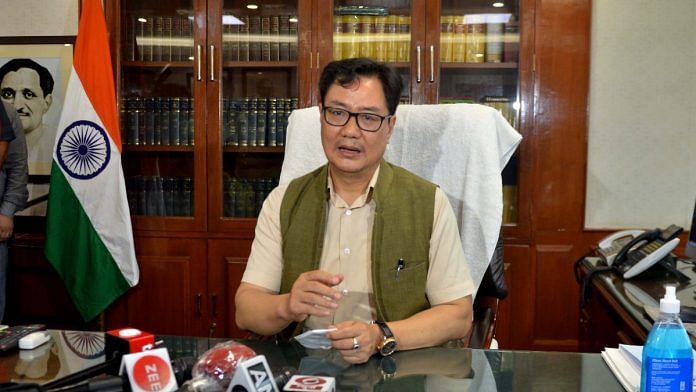New Delhi: Pointing out that the finalisation of the Memorandum of Procedure (MoP) regarding appointment of judges is still “pending”, Union Law Minister Kiren Rijiju has, in a letter to Chief Justice of India (CJI) D.Y. Chandrachud, suggested inclusion of a government representative in the “search-cum-evaluation committee” that will provide inputs on “suitable candidates” to the appointment panel or the collegium, ThePrint has learnt.
As per the minister’s letter, sent on 6 January, 2023, the search-cum-evaluation committee at the level of High Court would have a state government as well as a central government nominee, while a similar committee in the Supreme Court would comprise a representative of the central government.
The letter was addressed on the same day a top court bench headed by Justice Sanjay Kishan Kaul expressed “extreme concern” over the government sitting over 10 files related to transfer of judges.
The letter speaks about how best the appointment system can be “streamlined” and advises the CJI to constitute a search-cum-evaluation panel. Supreme Court sources said the collegium is yet to deliberate on the letter.
Sources aware of the development told ThePrint that the search-cum-evaluation committee would consolidate the data on advocates — including inputs on their performance as lawyers — and if there are any complaints pending against them, and forward it to the collegium, which will then take a final call on appointments.
The High Court collegium is led by the Chief Justice of the concerned HC and comprises top two judges after her/him. The Supreme Court collegium for HC appointments is headed by the CJI and has two senior-most judges in hierarchy. But the panel for appointments to the SC is a body of five judges headed by the CJI and having four senior-most judges.
At present the appointment mechanism as outlined in the MoP does not include a search-cum-evaluation committee.
However, the National Judicial Appointments Commission (NJAC) verdict, delivered in 2015, talked about a secretariat in the SC to collate a database on suitable lawyers who could be considered for elevation. The verdict had advised both the central government and Supreme Court collegium to modify the MoP to “refine the appointment process”.
However, the MoP has remained a bone of contention between the two institutions.
While the Modi government feels that finalisation of the MoP, as per the NJAC judgment, is still pending, the judiciary has on its part said the existing MoP is the “law of the land” and should be followed.
Also read: SC raps Modi govt for delaying judges’ transfers — ‘indicates other factors coming into play’
‘Panel should have both state & Centre representatives’
This is not the first time Rijiju has asked the SC to fine tune and finalise the MoP. In August 2021 the minister had in a letter asked the top court to supplement the existing MoP to formalise the appointment of ad-hoc judges.
This was sent four months after the top court directed the government to make ad-hoc appointments to high courts under Article 224A of the Constitution, which says such a judge can be recruited only with the “previous consent” of the President.
However, while the SC is yet to respond to this letter, it has taken up the matter on the judicial side. Justice Kaul’s bench, which is seized of petitions to expedite judicial appointments, sought the central government’s status report on ad-hoc appointments. In response, the government placed Rijiju’s August 2021 letter before the bench. The court is yet to take up this issue again.
Sources quoted above further told ThePrint that the 6 January letter does not envisage to disturb the collegium, but makes a suggestion to have a search-cum-evaluation committee both in the High Court as well as the apex court.
“As per the NJAC verdict, a secretariat should have been set-up so that data of suitable candidates can be updated on a regular basis. The minister’s letter takes a step forward by recommending the constitution of a search-cum-evaluation panel,” one of the sources mentioned said.
Another source explained that a list of suitable candidates can even include government lawyers — including those appearing for states. “Therefore, apart from having nominees of the judiciary, the letter advises the panel to have a state and Centre representative each, so that they can provide inputs on lawyers who argue for the respective government,” the source said.
“The idea of having such a committee is that after receiving information from diverse sources such as judges, state governments and Centre, proper and factual inputs can be provided to the collegium so that its members can take a mindful decision,” added the source.
(Edited by Zinnia Ray Chaudhuri)
Also read: Indian judiciary’s well-being is at stake. Conflicts over collegium system can create tension



